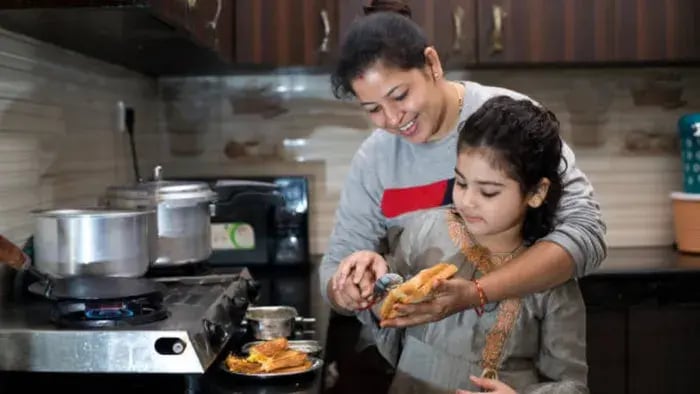- Milk
- Curd (Dahi)
- Paneer
- Ragi (Finger Millet)
- Green Leafy Vegetables
- Sesame Seeds (Til)
- Nuts (Almonds and Walnuts)
- Eggs
- Fish (Especially Rohu)
- Lentils and Pulses (Dals)
Introduction
Strong bones are the base of a healthy and active childhood. As children grow, their bones keep developing and need the right support through balanced meals and daily habits. Without enough key nutrients in early years, bones may not reach their full strength, which can affect posture, stamina, and long-term health.

Calcium is one of the main nutrients for bone health; it helps build bone density and keeps the skeletal system strong. Foods like milk, curd, paneer, ragi, sesame seeds, and green leafy vegetables are rich in calcium and easy to include in daily meals. But calcium alone is not enough.
Vitamin D plays a big role in helping the body absorb calcium. Sunlight is the best natural source, and spending some time outdoors daily can support healthy levels. Along with that, nutrients like phosphorus, magnesium, and protein also support bone structure and strength. Foods like eggs, lentils, nuts, fish and whole grains provide these bone-friendly elements.
A child’s diet doesn’t need to be complicated. Meals made from simple local ingredients can give the body everything it needs to grow strong bones. The goal is to offer a variety of natural foods that work together to build strength from within — so kids can jump, play and grow with confidence.
10 Must-Have Foods for Strong Bones: Nutrients for Every Child

Milk
As per FASSI, milk is one of the best sources of calcium and has vitamin D, phosphorus and protein, which all support bone health. Whether warm in the morning or as part of the bedtime routine, milk is an easy and convenient addition to your child’s diet.
Curd (Dahi)
According to a study published in the Indian J Med Res 2014, curd is rich in calcium and probiotics, which not only strengthen bones but also support digestion and overall gut health. A bowl of plain curd with lunch or dinner is a simple way to boost bone nutrients. You can also add it to smoothies, raitas, or sweeten it with jaggery.
Paneer
As per the study published in J Food Sci Technol 2011, paneer is full of calcium and protein, a great food for growing bones and muscles. It’s also easy to add to various dishes like paneer bhurji, paratha stuffing, or mixed into sabzis. It’s the dairy in a more filling form.
Ragi (Finger Millet)
As per the study published in J Food Sci Technol 2011, Ragi is a great plant-based source of calcium, iron and magnesium. Perfect for kids who don’t consume much dairy. Ragi porridge, dosa, or roti can be made and enjoyed with various flavors and are packed with nutrition in every bite.
Green Leafy Vegetables
According to FASSI, spinach (palak), fenugreek (methi) and amaranth (chaulai) are loaded with calcium, iron, and vitamin K, which are important for bone health. You can cook green leafy vegetables with dals, parathas or add them to khichdi, it makes it easier for kids to eat. Serving greens regularly lays a strong foundation for your child’s growth.
Sesame Seeds (Til)
According to ICMR, til is a rich source of calcium, zinc and healthy fats. These nutrients help in bone formation and bone density. You can add sesame seeds in ladoos, chikkis or sprinkle toasted seeds over rotis or vegetables, and it is very beneficial for your body during winters.
Nuts (Almonds and Walnuts)
As per the study published in Foods 2022, nuts like almonds and walnuts have healthy fats, magnesium, and a small amount of calcium. These nutrients help in bone building and joint support. Soaked almonds in the morning or chopped nuts in porridge or halwa are easy ways to boost your child’s bone strength.
Eggs
According to FASSI, eggs are a good source of protein and vitamin D, both important for bone health. Vitamin D helps the body absorb calcium. Include an egg in breakfast or lunch, and your child will have a strong start to the day and enough support for bone development.
Fish (Especially Rohu)
According to a study published in Nutrients 2014, Indian fish like rohu are rich in both calcium and vitamin D. These nutrients help in bone density and long-term bone health. Lightly cooked fish with rice or roti can be a healthy and tasty meal for your child once or twice a week.
Lentils and Pulses (Dals)
According to ICMR, toor dal, moong dal and chana dal are not only rich in protein but also have magnesium and phosphorus, minerals that are important for bone structure. Serve with rice or roti for a complete protein-rich meal that supports both muscle and bone growth.
Conclusion

Strong bones are built with the right foods eaten over a period of time. Many Indian ingredients are already rich in calcium, protein, vitamin D, and magnesium, which your child needs. With a thoughtful mix of dairy, grains, greens and seeds, you can support your child’s bone health naturally every day. These foods don’t need to be fancy or difficult — just fresh, familiar, and full of nutrition.
Her love for storytelling began with reading her grandfather’s speeches, where Tarishi saw the power of words in creating lasting memories. Combining her passions for food and writing, she has turned her life into a fulfilling path of sharing stories that celebrate flavours and how food brings communities together.
The views expressed are that of the expert alone.
The information provided in this content is for informational purposes only and should not be considered a substitute for professional medical advice, diagnosis, or treatment. Always seek the advice of your physician or another qualified healthcare provider before making any significant changes to your diet, exercise, or medication routines.
References
https://www.nin.res.in/dietaryguidelines/pdfjs/locale/DGI24thJune2024fin.pdf
https://pmc.ncbi.nlm.nih.gov/articles/PMC3942730/
https://www.fssai.gov.in/upload/media/FSSAI_News_Vitamin_NDTVFood_31_08_2021.pdf
https://pmc.ncbi.nlm.nih.gov/articles/PMC9601893/
https://fssai.gov.in/upload/uploadfiles/files/Compendium_Nutra_29_09_2021.pdf
https://pmc.ncbi.nlm.nih.gov/articles/PMC4008736/
https://fortification.fssai.gov.in/commodity?commodity=fortified-milk
















